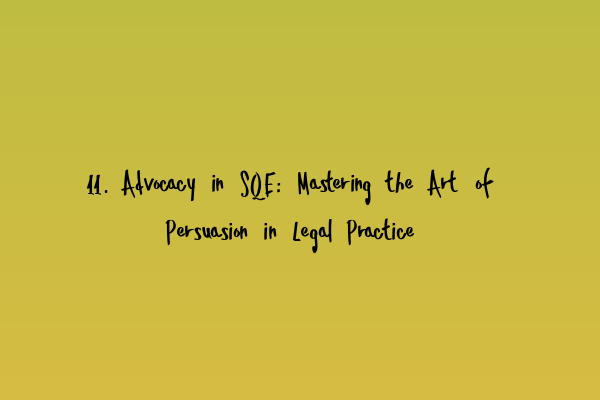Advocacy in SQE: Mastering the Art of Persuasion in Legal Practice
Advocacy is a critical skill for any aspiring solicitor. It involves the effective presentation of arguments and the ability to persuade others. In the Solicitors Qualifying Examination (SQE), advocacy plays a significant role in assessing a candidate’s practical legal skills. Whether you are preparing for the SQE or seeking to enhance your advocacy skills in legal practice, this article will provide you with valuable insights and tips to master the art of persuasion.
1. Prepare Thoroughly
Preparation is key to successful advocacy. Before appearing in court or conducting negotiations, gather all the facts, understand the relevant laws and precedents, and identify the key arguments to support your case. Thorough preparation allows you to confidently present your case and respond to counterarguments effectively.
2. Understand Your Audience
Tailoring your advocacy to the specific needs and expectations of your audience is essential. Whether you are addressing a judge, jury, or opposing counsel, consider their knowledge, biases, and preferences. This understanding will help you structure your arguments and choose persuasive techniques that resonate with your audience.
3. Structure Your Arguments
Clear and logical arguments are crucial for effective advocacy. Organize your thoughts in a coherent manner, starting with a concise introduction that outlines the key points you will address. Support your arguments with evidence, statutes, and case law to strengthen your position and convince your audience.
4. Use Persuasive Language
Words have power. Choose your language carefully to make your arguments more compelling. Use strong and persuasive language, but always remain professional. Tailor your choice of words to your audience and emphasize the most important aspects of your case.
5. Maintain Confidence and Professionalism
Confidence and professionalism are crucial for effective advocacy. Maintain a confident and composed demeanor while presenting your arguments. Be respectful to opposing counsel and the court. Displaying professionalism enhances your credibility and increases the persuasiveness of your arguments.
6. Engage with the Body Language
Non-verbal communication plays a significant role in advocacy. Pay attention to your own body language and that of your audience. Maintain eye contact, stand tall, and use appropriate gestures to convey confidence and assertiveness. Additionally, observe the body language of your audience to gauge their engagement and adjust your approach accordingly.
7. Practice Active Listening
A key aspect of effective advocacy is actively listening to others. Listen attentively to the opposing counsel’s arguments and questions. Respond thoughtfully and address their concerns respectfully. Demonstrating active listening skills not only builds rapport but also allows you to respond effectively, dismantling weak arguments and strengthening your case.
8. Handle Objections and Counterarguments
Anticipating and effectively addressing objections is an essential skill in advocacy. Prepare yourself for possible counterarguments by thoroughly examining your case from all angles. When faced with objections, respond confidently, providing logical explanations and supporting evidence. Addressing counterarguments in a persuasive manner can significantly strengthen your case.
9. Adapt to Different Settings
Advocacy takes place in various settings, including courts, negotiations, and client meetings. Adapt your advocacy skills to suit each setting. In court, adhere to legal procedures and rules of evidence. During negotiations, focus on finding common ground and reaching agreements. When communicating with clients, explain legal concepts and options clearly using plain language.
10. Seek Feedback and Learn from Experience
Continuous improvement is key to mastering advocacy. Seek feedback from mentors, supervisors, and experienced practitioners. Reflect on your performances and identify areas for improvement. Learn from your experiences, both successes, and failures, to refine your skills and become a more persuasive advocate.
11. Enroll in SQE Preparation Courses
To excel in advocacy and secure success in the SQE, consider enrolling in SQE preparation courses. These courses provide comprehensive training in legal skills, including advocacy. They offer guidance, practice materials, and mock exams to help you sharpen your advocacy skills and prepare effectively for the SQE. Check out our SQE 1 Practice Exam Questions and SQE 1 Practice Mocks FLK1 FLK2 to get started. You can also explore our SQE 2 Preparation Courses and SQE 1 Preparation Courses to enhance your overall legal knowledge and skills.
Mastering the art of persuasion in advocacy is a lifelong journey. By understanding the fundamentals, preparing diligently, and continuously refining your skills, you can become a persuasive and successful advocate in both the SQE and legal practice.
For more information on SQE exam dates and other aspects of the qualification, refer to the SRA SQE Exam Dates.
